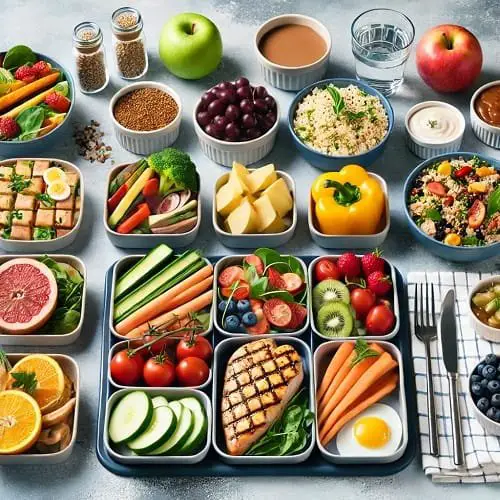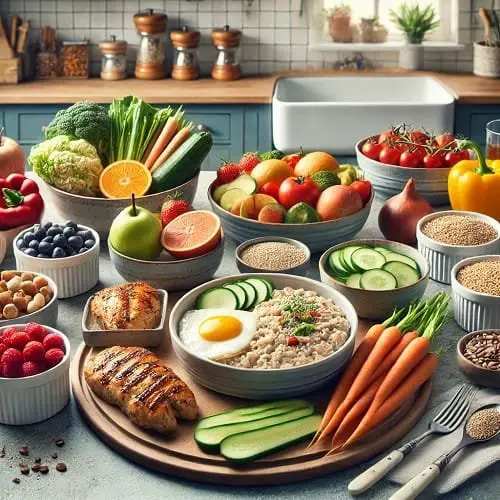Introduction: Understanding Menopause and the Importance of a Diet Plan
Menopause is a natural phase in every woman’s life, typically occurring between the ages of 45 and 55, signaling the end of menstruation and fertility. However, this phase is accompanied by its own set of difficulties. Many women experience a range of menopause symptoms that can be physically and emotionally taxing. Common symptoms include weight gain, hot flashes, night sweats, and mood swings. These changes in the body’s hormonal balance can lead to significant discomfort, but they can be managed with the right approach.
One of the most effective ways to navigate through menopause is by adopting a healthy lifestyle, particularly when it comes to nutrition. During this time, a tailored diet plan is crucial to help manage hormone balance and alleviate some of the more common menopause symptoms. A well-structured 7-day menopause diet plan is designed to help support your body with the nutrients it needs to cope with these changes. It can help with weight gain, stabilize mood swings, reduce hot flashes, and even improve energy levels.
By focusing on a 7-day menopause diet plan, you can take control of your health and empower yourself to feel better during this natural transition. Adopting such a plan not only helps manage the physical symptoms but also contributes to long-term well-being and vitality as you embrace this next phase of life.
Table of Contents
What is a 7-Day Menopause Diet Plan?

A 7-day menopause diet plan is a short-term, structured eating guide designed to provide the essential nutrients your body needs during the menopause transition. This carefully crafted plan focuses on meeting the nutritional needs of women going through menopause, addressing challenges like hormone regulation, weight gain, and the overall symptoms associated with this phase.
During menopause, the body experiences fluctuations in hormones, which can affect metabolism and cause unwanted weight gain. A balanced diet is critical to help mitigate these changes. The 7-day menopause diet plan ensures that you’re getting the right combination of food for menopause, including a mix of healthy fats, lean proteins, fiber-rich vegetables, and whole grains, all of which play a vital role in supporting overall health. By including these foods, this diet helps maintain stable hormone regulation, reducing the intensity of menopause symptoms like mood swings and hot flashes.
Moreover, this plan isn’t just about surviving menopause—it’s about thriving. It emphasizes nutrient-dense foods that fuel your body, boost your energy levels, and promote weight loss when followed consistently. By following a structured, time-bound approach, the 7-day menopause diet plan helps reset your habits, allowing you to experience significant improvements in energy and overall wellness within just one week.
The beauty of a 7-day menopause diet plan is its simplicity. With just a week’s worth of meals and snacks, you can see noticeable benefits in your health and well-being. This approach isn’t a quick fix, but rather a stepping stone to establishing long-term healthy eating habits that support a balanced life through menopause and beyond.
Key Nutrients for Menopause and Their Role in the 7-Day Diet Plan

During menopause, the body’s nutritional requirements evolve to support various physiological changes, including hormone fluctuations, bone density loss, and changes in metabolism. The 7-day menopause diet plan incorporates several key nutrients that are essential for managing these changes and alleviating menopause symptoms. These nutrients—calcium, fiber, omega-3, antioxidants, and vitamins D and B12—play a vital role in supporting overall health and ensuring that women can navigate this phase with greater ease.
Calcium is one of the most important nutrients for women during menopause. As estrogen levels decrease, the risk of bone density loss increases, making it essential to include calcium-rich foods such as dairy products, leafy greens, and fortified plant-based milks. Consuming enough calcium helps maintain strong bones and prevents osteoporosis, a common concern during menopause.
Another crucial nutrient is fiber, which supports digestion and helps maintain a healthy weight. High-fiber foods like vegetables, whole grains, and legumes are key in managing weight gain during menopause. Fiber also helps regulate blood sugar levels and alleviates constipation, a common issue faced during this time.
Omega-3 fatty acids, found in fatty fish like salmon and walnuts, are powerful anti-inflammatory nutrients that can help manage symptoms like hot flashes and joint pain. These healthy fats also support hormone regulation by promoting a balanced inflammatory response and reducing the severity of mood swings.
Antioxidants, including vitamins A, C, and E, play a vital role in reducing oxidative stress caused by hormonal changes. These powerful compounds, found in colorful fruits and vegetables, help protect the body from cellular damage and promote skin health, a concern for many women experiencing the aging effects of menopause.
Finally, vitamins D and B12 are crucial for energy production and maintaining bone health. Vitamin D helps the body absorb calcium and supports immune function, while vitamin B12 is essential for mood regulation, brain health, and energy levels. These vitamins are particularly important in a 7-day menopause diet plan to ensure long-term health benefits.
Incorporating these nutrients into your 7-day menopause diet plan ensures that you are not only addressing immediate menopause symptoms but also setting the foundation for a healthier, more balanced life post-menopause.
The 7-Day Menopause Diet Plan: A Day-by-Day Breakdown

The 7-day menopause diet plan is designed to provide a well-rounded, nutritious eating strategy that supports your body through the challenges of menopause. By carefully curating meals for each day, this plan helps manage symptoms like weight gain, mood swings, and hot flashes. Below is a detailed day-by-day breakdown that includes breakfast, lunch, dinner, and snacks, while incorporating essential nutrients such as healthy fats, proteins, fiber, and hydration.
Day 1:
- Breakfast: Start the day with a protein-packed smoothie made with unsweetened almond milk, spinach, chia seeds, and a scoop of protein powder. Add some berries for antioxidants.
- Lunch: A mixed greens salad with grilled chicken, avocado, cucumber, and a lemon-olive oil dressing. Avocados are an excellent source of healthy fats.
- Dinner: Grilled salmon with steamed broccoli and quinoa. The omega-3 fatty acids from salmon help regulate hormone balance, while quinoa provides fiber and protein.
- Snack: A handful of almonds and a small apple. This snack provides a good mix of healthy fats and fiber, supporting satiety and energy levels.
- Hydration Tip: Drink at least 8 cups of water throughout the day to stay hydrated and support your body’s detoxification process.
Day 2:
- Breakfast: A bowl of oatmeal topped with chia seeds, ground flaxseeds, and a drizzle of honey. Oats provide fiber and help with weight management.
- Lunch: A whole-grain wrap with lean turkey, spinach, tomato, and mustard. This meal offers a balance of protein, fiber, and healthy fats.
- Dinner: Stir-fried tofu with mixed vegetables (bell peppers, zucchini, and kale), served over brown rice. Tofu is a great source of plant-based protein and helps with hormone regulation.
- Snack: Greek yogurt with a sprinkle of walnuts. Greek yogurt is rich in protein, while walnuts are packed with omega-3s.
- Hydration Tip: Add lemon or cucumber to your water for a refreshing twist that encourages hydration.
Day 3:
- Breakfast: Scrambled eggs with sautéed spinach and whole-grain toast. Eggs provide a great source of protein, while spinach is rich in calcium.
- Lunch: A quinoa bowl with chickpeas, roasted sweet potatoes, and a tahini dressing. This meal offers a combination of fiber and protein for sustained energy.
- Dinner: Baked chicken breast with a side of roasted Brussels sprouts and a quinoa salad. The chicken is high in protein, while Brussels sprouts are full of antioxidants.
- Snack: A small portion of hummus with carrot sticks. Hummus provides healthy fats and fiber to keep you full between meals.
- Hydration Tip: Infuse your water with fresh mint or berries to make hydration more enjoyable.
Day 4:
- Breakfast: A smoothie made with kale, banana, Greek yogurt, and a spoonful of almond butter. This meal is rich in protein and fiber.
- Lunch: A tuna salad with mixed greens, avocado, and olive oil dressing. Tuna offers omega-3s that support hormone regulation.
- Dinner: Grilled shrimp with a side of roasted cauliflower and quinoa. Shrimp is a lean protein that helps with weight management.
- Snack: A boiled egg and a handful of cherry tomatoes. This snack provides a good balance of protein and vitamins.
- Hydration Tip: Make it a habit to drink a glass of water before each meal to stay hydrated and aid digestion.
Day 5:
- Breakfast: Chia pudding made with unsweetened coconut milk, chia seeds, and topped with fresh fruit. This nutrient-packed breakfast provides fiber and healthy fats.
- Lunch: A whole-grain wrap with lean beef, lettuce, tomatoes, and avocado. The combination of lean protein and healthy fats will help you feel satisfied.
- Dinner: Grilled turkey breast with a side of sautéed green beans and quinoa. The turkey is rich in protein to support muscle maintenance.
- Snack: A handful of mixed nuts. This provides a mix of healthy fats, protein, and fiber to keep you energized.
- Hydration Tip: Keep a water bottle handy throughout the day to ensure you’re getting enough fluids.
Day 6:
- Breakfast: A protein shake made with almond milk, spinach, and a tablespoon of almond butter. This shake offers a good dose of protein and healthy fats.
- Lunch: A mixed salad with chickpeas, cucumbers, tomatoes, and a balsamic vinaigrette. Chickpeas are a great source of fiber and plant-based protein.
- Dinner: Baked cod with roasted vegetables (carrots, zucchini, and bell peppers). Cod is a lean fish that provides protein without adding extra fat.
- Snack: A small portion of cottage cheese with a few slices of pineapple. Cottage cheese is rich in protein and supports muscle repair.
- Hydration Tip: Include herbal teas such as peppermint or chamomile, which can help reduce bloating and support digestion.
Day 7:
- Breakfast: Avocado toast with a poached egg and a side of fresh fruit. This meal balances healthy fats and protein for a satisfying start to the day.
- Lunch: A vegetable stir-fry with tofu, carrots, broccoli, and mushrooms served over brown rice. This provides a high dose of fiber, protein, and antioxidants.
- Dinner: Grilled salmon with a side of steamed spinach and quinoa. The omega-3s in salmon help regulate hormones and reduce inflammation.
- Snack: A handful of mixed berries with a dollop of Greek yogurt. This snack provides antioxidants, protein, and fiber.
- Hydration Tip: End your day with a glass of water infused with a slice of lemon, which aids digestion and keeps you hydrated.
Key Tips for Success:
- Portion Control: One of the most important aspects of any diet plan is portion control. Eating the right portion sizes ensures you don’t overeat while still getting the nutrients you need.
- Hydration: Hydration is key for maintaining energy levels and reducing bloating. Aim to drink at least 8 glasses of water daily, and feel free to add slices of fruits or herbs like mint to make it more enjoyable.
- Balance Healthy Fats, Proteins, and Carbs: Make sure your meals contain a good balance of healthy fats, proteins, and carbohydrates to keep your metabolism working efficiently and your energy levels stable.
RELATED POSTS:
How to Treat Menopause Back Pain: Effective Solutions & Tips
Hip Pain and Menopause: Causes, Symptoms, and Relief Tips
Menstrual Cramps After Menopause: Effective Solutions
Menopause and Anger Towards Husband: Causes & Coping Tips
By following this 7-day menopause diet plan, you can give your body the support it needs during menopause. This plan incorporates nutrient-dense foods that help manage weight gain, improve hormone regulation, and reduce menopause symptoms. Additionally, it sets the foundation for a sustainable and healthy lifestyle beyond just the 7-day period.
Benefits of Following a 7-Day Menopause Diet Plan

Following a structured 7-day menopause diet plan offers numerous health benefits that can make a significant difference in how you feel throughout menopause. By focusing on nutrient-dense meals and balanced nutrition, this diet plan provides essential support for managing common menopause symptoms, such as weight gain, hot flashes, and mood swings, while promoting overall well-being.
One of the key advantages of the 7-day menopause diet plan is its ability to provide a consistent energy boost. By incorporating nutrient-rich foods like lean proteins, healthy fats, and fiber-rich carbohydrates, this diet plan ensures sustained energy levels throughout the day. This can help combat the fatigue and tiredness that many women experience during menopause, allowing you to feel more vibrant and active.
Another significant benefit is weight management. Menopause often leads to changes in metabolism and a tendency to gain weight, particularly around the abdomen. A well-balanced diet that emphasizes portion control, whole foods, and healthy fats helps keep your weight in check. The 7-day menopause diet plan supports weight loss by reducing excess calorie intake and promoting nutrient absorption for a healthier metabolism.
Additionally, the 7-day menopause diet plan helps regulate digestion. Many women experience digestive issues during menopause, including constipation and bloating. The inclusion of fiber-rich foods like vegetables, fruits, and whole grains can promote better digestion and reduce bloating, offering relief from common discomforts.
The benefits also extend to mood regulation. The right nutrients, such as omega-3 fatty acids and B-vitamins, help balance hormones and stabilize mood swings. This can significantly improve your emotional well-being, making it easier to manage the emotional ups and downs associated with menopause.
Finally, a well-rounded diet can also contribute to better sleep. Certain foods in the diet, like those rich in magnesium and tryptophan, promote relaxation and support a deeper, more restful night’s sleep. Good quality sleep is essential for overall health and plays a pivotal role in regulating mood, energy levels, and cognitive function.
In conclusion, the 7-day menopause diet plan offers a comprehensive approach to managing menopause symptoms. From an energy boost and improved weight management to better digestion, mood regulation, and sleep quality, the benefits of following this diet plan are significant, helping women feel more balanced, healthier, and empowered during this life transition.
Tips for Staying on Track with Your 7-Day Menopause Diet Plan

Staying consistent with your 7-day menopause diet plan can be a challenge, especially as you balance busy schedules and other responsibilities. However, with the right strategies in place, you can ensure success and stay on track throughout the entire plan.
One key strategy is meal prep. Preparing your meals in advance not only saves time but also ensures that you always have healthy, nutrient-dense foods ready to go. Set aside time at the beginning of the week to chop vegetables, portion out snacks, and cook meals in bulk. This eliminates the temptation of unhealthy, quick alternatives and helps you stick to your 7-day menopause diet plan with ease.
Tracking your progress is another effective way to stay motivated. Keep a food journal or use a meal-tracking app to monitor what you’re eating, as well as how you’re feeling each day. Tracking progress helps you identify patterns, recognize successes, and make adjustments when needed. Additionally, it serves as a visual reminder of how far you’ve come, which can be motivating when you’re tempted to deviate from your plan.
Staying motivated throughout the week can be difficult, but setting realistic goals can keep you focused. Celebrate small wins, whether it’s sticking to your meals for a day or experiencing a boost in energy. Share your progress with a friend, a support group, or a health professional who can provide encouragement and accountability.
Lastly, mindful eating is crucial for long-term success. Paying attention to portion sizes, savoring each bite, and tuning in to your body’s hunger cues are essential for sustaining the 7-day menopause diet plan over time. Mindful eating helps you stay attuned to your body’s needs and promotes healthier, more balanced eating habits in the future.
By incorporating these strategies—meal prep, tracking progress, staying motivated, and practicing mindful eating—you’ll ensure that your 7-day menopause diet plan becomes a lasting part of your healthy lifestyle.
ALSO READ
How to Increase AMH Hormone Levels Naturally: Effective Tips
Healthy Protein Balls for Breastfeeding Moms
Can I Take Creatine While Breastfeeding? Key Facts
Conclusion: Start Your Journey to Better Health with the 7-Day Menopause Diet Plan
The 7-day menopause diet plan is more than just a temporary solution—it’s a powerful tool that can lead to a complete transformation in how you experience menopause. By focusing on nutrient-dense foods and balanced meals, this plan supports menopause wellness and helps alleviate common symptoms such as weight gain, hot flashes, and mood swings.
Starting this plan isn’t just about following a week’s worth of meals—it’s about adopting healthy habits that will continue to benefit you long after the seven days are over. The right nutrition can provide lasting long-term benefits, from improved energy and better sleep to enhanced digestion and regulated mood.
If you’re ready to take the first step toward a healthier, more balanced lifestyle, the 7-day menopause diet plan is the perfect starting point. By embracing this structured approach, you’ll set yourself up for lasting health and wellness during this significant life stage. Commit to the plan, and you’ll begin to experience the many positive changes it can bring.
Frequently Asked Questions (FAQs)
How does the 7-Day Menopause Diet Plan help with weight loss?
The 7-day menopause diet plan focuses on balanced meals that regulate metabolism and support weight management. By incorporating fiber, healthy fats, and lean proteins, the plan helps control hunger, stabilize blood sugar levels, and reduce unhealthy cravings, ultimately promoting weight loss during menopause.
Can I follow the 7-Day Menopause Diet Plan if I have food allergies or dietary restrictions?
Yes, the 7-day menopause diet plan can be customized to fit various dietary restrictions. If you have allergies or specific needs like gluten-free, dairy-free, or vegetarian, you can swap out certain ingredients to maintain nutritional balance while still reaping the benefits of the plan. It’s always a good idea to consult with a healthcare professional before starting any new diet.
What are the key nutrients I should focus on during menopause?
During menopause, key nutrients such as calcium, fiber, omega-3 fatty acids, antioxidants, and vitamins D and B12 are essential. These nutrients support bone health, hormone regulation, and digestion, while also helping alleviate symptoms like hot flashes, mood swings, and fatigue.
How can I stay motivated to stick with the 7-Day Menopause Diet Plan?
Staying motivated can be easier when you track your progress, set small achievable goals, and practice mindful eating. Meal prepping in advance and sharing your journey with a friend or support group can provide extra encouragement. Remember, each small step you take towards following the 7-day menopause diet plan will lead to lasting health benefits.






